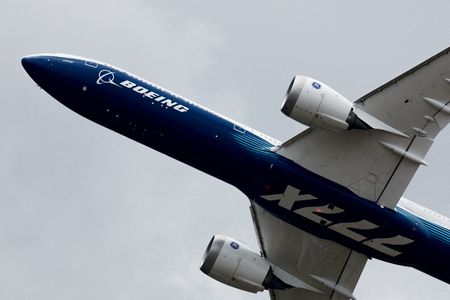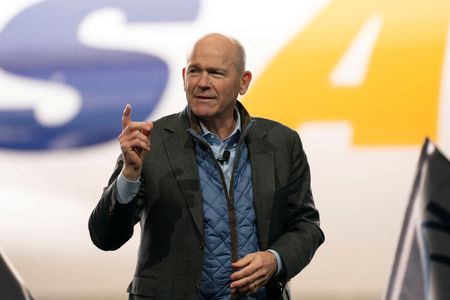By Abhijith Ganapavaram and Allison Lampert
(Reuters) -Boeing on Wednesday reported its first quarterly revenue drop in seven quarters, but the U.S. planemaker beat analyst expectations that were lowered after a January mid-air blowout of a door plug prompted it to slow production of its strongest-selling jets.
After the report, Boeing CEO Dave Calhoun told CNBC that a deal to acquire its key supplier Spirit AeroSystems is more than likely during the second quarter.
Issues that must be worked out include price and talks with Spirit customer Airbus , Boeing’s major rival. But Calhoun told analysts Boeing can move forward without full clarity on the Airbus side.
“We’re not being held hostage,” said Calhoun who is leaving by the end of the year.
Quarterly revenue was $16.57 billion, down from $17.92 billion a year earlier but beating expectations of $16.23 billion. Boeing and Spirit Aero shares were down about 3% in early afternoon trade.
Boeing CFO Brian West told analysts second quarter cash burn would be “sizeable” although he expected free cash usage to improve from the $3.93 billion cash burn in the first quarter. That was less than the $4.49 billion analysts expected following the Jan. 5 accident involving a nearly new 737 MAX 9 jet.
“Well it could have been worse. While the loss and the cash outflow are not as bad as feared, the company is still clearly facing some serious challenges,” Vertical Research Partners analyst Robert Stallard said in a note.
In the afternoon, Moody’s cut Boeing’s credit rating to the bottom of investment grade. The agency expects headwinds surrounding the company’s commercial airplanes to persist at least through 2026 when Boeing has $8 billion in debt coming due.
Multiple legal actions resulted from the Alaska Airlines accident. Boeing recorded an earnings charge of $443 million, net of insurance recoveries, according to a company filing.
Since the accident, the U.S. Federal Aviation Administration (FAA) has imposed a cap on production of single-aisle 737 MAX jets and given Boeing 90 days from Feb. 28 to develop a comprehensive plan to improve quality control.
Reuters reported this month that output of Boeing’s cash-cow 737 MAX had fallen sharply as U.S. regulators stepped up factory checks. Calhoun said production will stay sporadic through the second quarter as the company devises a plan to better monitor its manufacturing system. He said production rates would not rise until the system is under control.
“So 90 days isn’t like ‘wave a magic flag, and everything is great,’ and you guys can go from 38 to 40” jets per month, Calhoun said. Boeing has engaged independent quality experts, whom Calhoun expects will stay for several years.
While Boeing has not named a successor, Calhoun told CNBC he believes commercial airplanes boss Stephanie Pope has potential to run the company.
Analysts have warned the slow pace of deliveries could delay Boeing’s financial and production goals. Boeing’s CFO said last month the company needs more time to hit a goal outlined in 2022 for an annual cash flow of about $10 billion by 2025 or 2026.
That goal is seen as key as Boeing works to accelerate its recovery from an earlier crisis after two MAX jets crashed in 2018 and 2019.
Boeing delivered 13 twin-aisle 787 Dreamliner jets in the quarter. It expects production to return to five per month later this year. Calhoun attributed the slowdown to supply chain issues involving airline seats and parts used in cooling.
Yet with production constrained at Boeing and Airbus, demand remains strong, though the European planemaker has increased its lead in the narrowbody market.
Calhoun said Boeing would have “largely delivered” its inventory of 737s and 787s by the end of the year, bringing in much-needed cash. He added that its defense business, which has been losing money, “will be progressing toward more historical levels of performance.”
Operating margins at Boeing’s defense business rebounded to 2.2% in the quarter from a negative 3.2% a year ago, though it still lost $222 million on certain fixed-price development programs.
Boeing delivered 67 737s in the quarter through March, down 41% from last year. Planemakers receive the bulk of the cash upon delivery of the aircraft.
Combined with compensation Boeing had to pay airlines for the temporary grounding of MAX 9 aircraft, margins at its commercial airplanes business deteriorated to negative 24.6% from negative 9.2%.
Overall adjusted loss per share narrowed to $1.13, beating expectations of loss per share of $1.76, as per LSEG data.
(Reporting By Allison Lampert in Montreal and Abhijith Ganapavaram in Bengaluru; Editing by Anil D’Silva, Chizu Nomiyama and David Gregorio)











